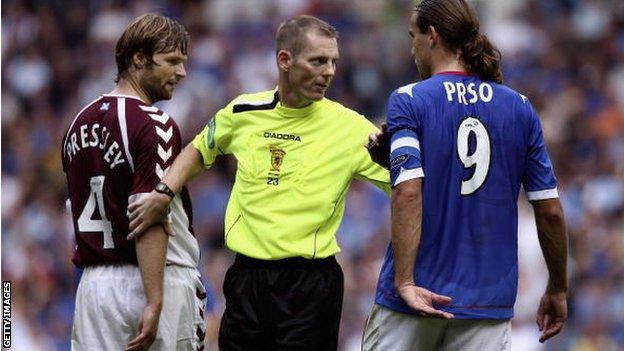Egyptian riots 'sinister', says former Fifa referee Kenny Clark
- Published

Former Scottish referee Kenny Clark was asked to referee a derby match in Cairo
Former Fifa referee Kenny Clark says the riots at an Egyptian football match in which 74 people died were "surprising" and "sinister".
Clark, who has refereed in Cairo, believes the violence after the game between Al-Ahly and Al Masry in Port Said was politically motivated.
Security forces have been criticised for not taking decisive action.
"It does strike me as both surprising and somewhat sinister that that's the case," Clark told BBC Radio 5 live.
"I've heard suggestions that they [security forces] weren't there in sufficient numbers or perhaps did not intervene quick enough, perhaps turning a blind eye to things."
Many fans suffocated after becoming trapped in a narrow corridor as they fled the violence, according to reports.
Al-Ahly assistant coach Pedro Barny said: "What happened was an unspeakable catastrophe."
The BBC's Jon Leyne: "They (Masry fans) charged firstly at the players and then the (al-Ahly) supporters"
Clark claimed the scenes were "indicative of something that has been pre-meditated and orchestrated", and "perhaps involved infiltration of the home fans by outsiders".
Clark, 50, is a former Scottish Premier League official who refereed three Scottish Cup finals and three Scottish League Cup finals.
He was invited to take control of a Cairo derby because of his experience of refereeing highly charged matches in Glasgow and Edinburgh.
"The backdrop is that Al-Ahly is perceived as the workers' club, if I can describe them in those terms," added Clark.
"Their supporters have been at the forefront of the protests in Tahrir Square against the old regime and some of the reports coming out of Egypt are suggesting there is something sinister going on in the background.
"The suggestions when I was there were that Al-Ahry were always hard done to because they were seen as representing, effectively, the lower classes.
"But that's something you hear frequently across Europe about different football teams, so I took it all with a pinch of salt at that time.
"Now I'm beginning to believe there is perhaps a bit more credence to it.
- Published2 February 2012
- Published2 February 2012
- Attribution
- Published2 February 2012
- Attribution
- Published2 February 2012
- Attribution
- Published2 February 2012